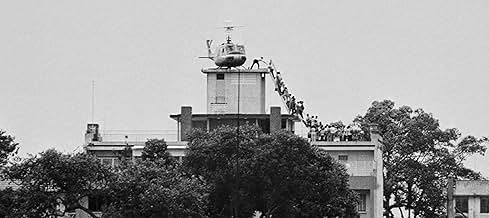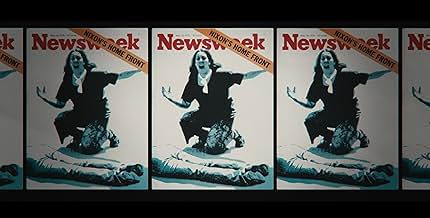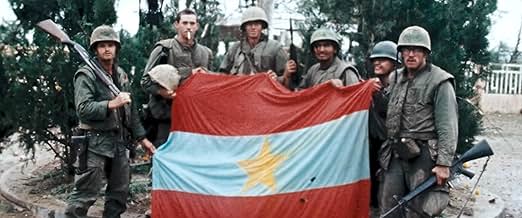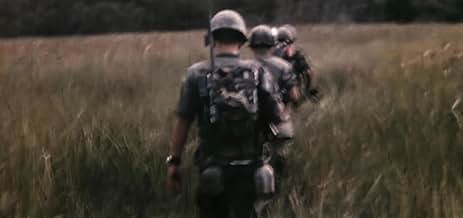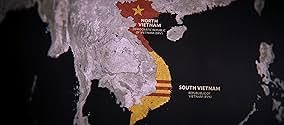Turning Point: La guerre du Vietnam
Original title: Turning Point: The Vietnam War
- TV Mini Series
- 2025
- 1h 15m
The Vietnam War's profound effects on American identity, causing social division and eroding government trust. More than military defeat, it transformed US politics and culture.The Vietnam War's profound effects on American identity, causing social division and eroding government trust. More than military defeat, it transformed US politics and culture.The Vietnam War's profound effects on American identity, causing social division and eroding government trust. More than military defeat, it transformed US politics and culture.
Browse episodes
Featured reviews
There is no new insight here, and if you're familiar with the Ken Burns series, this is the lackluster remake. It duly covers the various turning points, from French loss to Tet to scuttled peace talks and Nixon's genocidal campaigns to name a few. We get various asides along the way; the student anti-war movement, the elections of '68, the treatment of returning veterans.
If it's your first comprehensive surveying of the Vietnam story, you will get the whole thing. It is, as usual, told from the American perspective; ill-advised entanglement in a faraway jungle, increasingly bitter and chaotic. There are also some Vietcong voices this time around.
There's so much that went wrong in a decade that to survey as we do, with talking heads, and condensing to snippets, makes it seem self-evident. There's no way to tell what a world would look like in which the CIA didn't lose the plot probably starting with Cuba, for example, or 'domino effect' thinking didn't win over in policy circles. And it's important to note how badly Washington misunderstood context; the generals did really think in terms of fighting in the Pacific Theater, but there the troops had been propelled by Pearl Harbor and fighting the good fight.
If it's your first comprehensive surveying of the Vietnam story, you will get the whole thing. It is, as usual, told from the American perspective; ill-advised entanglement in a faraway jungle, increasingly bitter and chaotic. There are also some Vietcong voices this time around.
There's so much that went wrong in a decade that to survey as we do, with talking heads, and condensing to snippets, makes it seem self-evident. There's no way to tell what a world would look like in which the CIA didn't lose the plot probably starting with Cuba, for example, or 'domino effect' thinking didn't win over in policy circles. And it's important to note how badly Washington misunderstood context; the generals did really think in terms of fighting in the Pacific Theater, but there the troops had been propelled by Pearl Harbor and fighting the good fight.
I enjoy learning about 20th century American history, and the Vietnam War is one of my favorite documentary topics. I was initially concerned that this documentary would be filled with anti-American bias, however, it was much more balanced than I expected. The burning of villages by American/ARVN forces was discussed in one episode, for example, but it was also acknowledged that the North Vietnamese did a lot more of that kind of destruction. In one episode, a Viet Cong woman explains why she hated the Americans but also notes that many North Vietnamese didn't really understand what communism entailed. On the other hand, you had one million living in the North flee to the South when the civil war truce occurred, suggesting that many people did understand what life under communism meant (somewhat reminiscent of the East Germans escaping to West Germany, or maybe those Koreans living in the North who relocated to the South). To me this suggests the North Vietnamese victory was a pyrrhic one because while North Vietnam won, the people still didn't have most of the freedoms some people in the West take for granted nor the power. Of course, no more foreign control or interference. But I wonder if their lives changed for the better. We do know a million people from the South escaped (boat people) four years later.
Some critics have said that this documentary is a little too biased for their tastes. But I, someone who gets annoyed when I hear bias, didn't think so. To be sure, there was one guy in Episode 5 who annoyed me because I think he was being dramatic for the camera. Nevertheless, everyone else spoke in a measured way with occasional sincere emotions. All facts to me, and interesting perspectives, too. Some critics also suggest some important details were left out. I think this is true to some extent. No mention of the death of Ho Chi Min in 1969, for instance. I don't think General Giap was mentioned either. Still, I think for a five episode series, and given it's aim, it was wonderfully edited and directed. I love learning new details about subjects I'm already familiar with and this documentary did not disappoint.
I think the first 20-30 minutes of Episode 1 left me a little unclear how this documentary would play out. However, after that it started to grab my interest. As to be expected, there's a lot of sadness, grief, strife, and so on, on both sides. But don't take that as gratuitous anti-Americanism. Rather, I think the director was focused on telling a story from all points of view and how the Vietnam War permanently changed America and the relationship the American people has with their government because of it.
Some critics have said that this documentary is a little too biased for their tastes. But I, someone who gets annoyed when I hear bias, didn't think so. To be sure, there was one guy in Episode 5 who annoyed me because I think he was being dramatic for the camera. Nevertheless, everyone else spoke in a measured way with occasional sincere emotions. All facts to me, and interesting perspectives, too. Some critics also suggest some important details were left out. I think this is true to some extent. No mention of the death of Ho Chi Min in 1969, for instance. I don't think General Giap was mentioned either. Still, I think for a five episode series, and given it's aim, it was wonderfully edited and directed. I love learning new details about subjects I'm already familiar with and this documentary did not disappoint.
I think the first 20-30 minutes of Episode 1 left me a little unclear how this documentary would play out. However, after that it started to grab my interest. As to be expected, there's a lot of sadness, grief, strife, and so on, on both sides. But don't take that as gratuitous anti-Americanism. Rather, I think the director was focused on telling a story from all points of view and how the Vietnam War permanently changed America and the relationship the American people has with their government because of it.
Another exceptionally objective docuseries from the new master of historical shows.
As a Brit, I can appreciate that my reaction and perspective to this series & the Vietnam war in general is wildly different from anyone in the US. Conversely, since my country opted not to engage in the conflict, we weren't really educated on it any real detail - so broadly speaking, even as a bit of a history dweeb, I'm pretty ignorant when it comes to any of the decades-long western battles against communism.
That's why I'm especially grateful to the talents of Brian Knappenberg.
Rather than portraying 9/11, the Cold War or in this latest fine entry into his canon as a 'rah! Rah! America!' Indulgence, he's proactively evenhanded, fair & draws remarkably detailed and articulate accounts from people who were really there. Yet despite the density of information & intelligence with which it's done, it's still accessible to even a Luddite like me.
It's powerful, powerful stuff - and while I can absolutely 100% appreciate that this must be deeply grating for a lot of those in the states, as a fascinated outsider? It's quite an excellent entry into the mountains of existing work covering this engrossingly chaotic period in modern human history.
Bravo.
As a Brit, I can appreciate that my reaction and perspective to this series & the Vietnam war in general is wildly different from anyone in the US. Conversely, since my country opted not to engage in the conflict, we weren't really educated on it any real detail - so broadly speaking, even as a bit of a history dweeb, I'm pretty ignorant when it comes to any of the decades-long western battles against communism.
That's why I'm especially grateful to the talents of Brian Knappenberg.
Rather than portraying 9/11, the Cold War or in this latest fine entry into his canon as a 'rah! Rah! America!' Indulgence, he's proactively evenhanded, fair & draws remarkably detailed and articulate accounts from people who were really there. Yet despite the density of information & intelligence with which it's done, it's still accessible to even a Luddite like me.
It's powerful, powerful stuff - and while I can absolutely 100% appreciate that this must be deeply grating for a lot of those in the states, as a fascinated outsider? It's quite an excellent entry into the mountains of existing work covering this engrossingly chaotic period in modern human history.
Bravo.
Some comments are unfair to say that the series presented Ho Chi Minh as a leader who only wanted to turn Viet Nam communist. Very early on (I think latter part of Ep 1 or Ep 2 onwards), they narrated how Ho Chi Minh banked on the USA history's of struggle for independence against Great Britain, and hoped that the US would likewise support Viet Nam's fight against the French. It also recognized that in Viet Nam, the war was known as an "American War" instead of "Vietnam War", acknowledging the dominant US-centric perspective in calling it the latter.
For the most part, I found this documentary balanced, only because when I find myself sympathizing (?) with one side, it would give another perspective that makes you realize that none of those involved were innocent - they all have blood on their hands for having no regard for non-combatants/civilians. It's materials like this that give us a chilling reminder that war is never the answer.
For the most part, I found this documentary balanced, only because when I find myself sympathizing (?) with one side, it would give another perspective that makes you realize that none of those involved were innocent - they all have blood on their hands for having no regard for non-combatants/civilians. It's materials like this that give us a chilling reminder that war is never the answer.
After Ken Burns' magisterial and monumental 18-hour deep dive into the Vietnam War, you'd think there'd be nothing left to say. But "Turning Point: The Vietnam War" on Netflix proves there's still room for new voices, especially from both North and South Vietnam, that bring fresh, essential perspectives to this complex and chaotic chapter of history. The series is balanced, detailed without dragging, and as harrowing as any account of America's decades-long misadventure. Fifty years after the fall of Saigon, this story remains urgent and deeply unsettling. Like Brian Knappenberger's earlier "Turning Point" series on 9/11 and the Cold War, it's clear-eyed, unflinching, and committed to telling the truth, warts and all. It's definitely a worthy watch.
Did you know
- TriviaAired on the 50th anniversary of the Fall of Saigon.
Details
- Release date
- Country of origin
- Language
- Also known as
- Turning Point: The Vietnam War
- Production company
- See more company credits at IMDbPro
- Runtime
- 1h 15m(75 min)
- Color
Contribute to this page
Suggest an edit or add missing content



